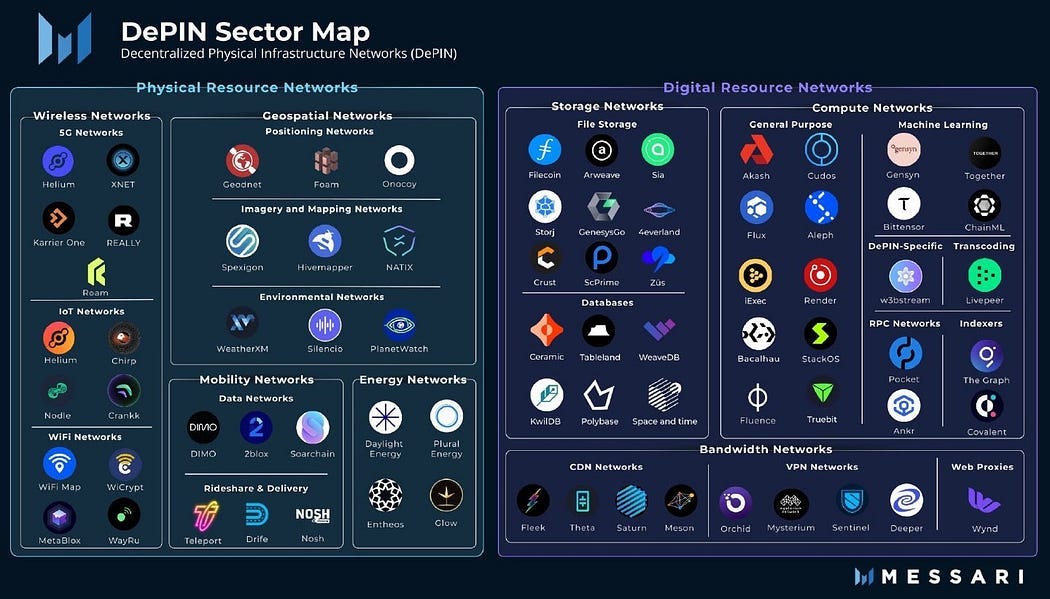insight - Distributed Systems - # Decentralized Physical Infrastructure Network (DePIN) Crypto Mining Projects
Top 10 Decentralized Physical Infrastructure Network (DePIN) Crypto Mining Projects for June 2024
Core Concepts
Exploring the top 10 DePIN crypto mining projects that offer passive income opportunities and discounts for early adopters.
Abstract
The content provides an overview of the top 10 Decentralized Physical Infrastructure Network (DePIN) crypto mining projects for June 2024. DePIN refers to the application of blockchain technology and decentralization principles to physical infrastructure and systems.
The author, a self-proclaimed DePIN beta tester, shares details on each project, including their mission, requirements to mine, estimated earnings, and discount codes or referral links. The projects covered are:
GEODNET: A blockchain-based RTK network that rewards users for hosting satellite miners.
NATIX: An app that incentivizes users to map their surroundings, powering a decentralized dynamic map.
DIMO: A platform that enables human-centric connected mobility and innovation.
Soarchain: A Layer 1 network for the mobility industry, offering customizable smart contracts and dApps.
WeatherXM: A community-powered weather network that rewards weather station owners.
Fry Foundation: A decentralized network of decentralized networks, built on the Algorand ecosystem.
UpRock: A platform that rewards users for contributing to the open AI landscape.
Grass: A platform that allows users to earn passive income by selling their unused bandwidth.
Silencio: A community-powered network that rewards users for providing hyper-local noise pollution data.
Hivemapper: A project aiming to build the world's freshest decentralized map with transparent and aligned incentives.
The author provides discount codes, referral links, and other incentives to encourage readers to explore and invest in these DePIN projects.
Top 10 DePIN Crypto Mining Projects for June 2024
Stats
GEODNET Estimated Monthly Earnings: $430
GEODNET Cost to Invest: $700 retail OR $660 with the new discount code
GEODNET Break-even ROI Timeframe: 45 Days (with the provided GEODNET Discount Code)
Soarchain Break-even ROI Timeframe: Likely instant, after airdrops are received!
Quotes
"GEODNET Satellite Miners are roof-mounted RTK reference stations that earn GEOD Tokens GEODNET data users receive validated and reliable RTK corrections from the community of Satellite Miners."
"DIMO is building a world where technology serves people first. In this world developers can innovate freely, privacy coexists with progress, and human-centric connected mobility can flourish."
"Soarchain, a Layer 1 Network, aims to establish a decentralized ecosystem where participants, including vehicles, data providers, and developers, can interact and exchange value securely."
Key Insights Distilled From
by Depin Beta T... at medium.com 06-03-2024
https://medium.com/@DePINBetaTester/top-10-depin-crypto-mining-projects-for-june-2024-a5161f900a26
Deeper Inquiries
How can the decentralization of physical infrastructure networks impact the broader adoption and integration of blockchain technology in various industries?
The decentralization of physical infrastructure networks, as seen in DePIN projects, can have a significant impact on the broader adoption and integration of blockchain technology across various industries. By applying blockchain principles to physical infrastructure and systems, DePIN projects enable a more transparent, secure, and efficient way of managing and sharing data. This decentralized approach eliminates the need for intermediaries, reduces costs, and enhances trust among participants. As a result, industries such as urban planning, transportation, and environmental monitoring can benefit from improved data accuracy, real-time information sharing, and streamlined processes. The use of blockchain technology in DePIN projects also opens up opportunities for new business models, collaboration, and innovation in traditionally centralized industries.
What potential challenges or limitations might arise in the development and scaling of these DePIN projects, and how could they be addressed?
Despite the promising potential of DePIN projects, several challenges and limitations may arise in their development and scaling. One key challenge is the need for widespread adoption and acceptance of blockchain technology in traditional industries that may be resistant to change. Additionally, the scalability of blockchain networks, especially in handling large volumes of data from physical infrastructure, could pose a challenge. Security concerns, regulatory hurdles, and interoperability issues with existing systems are also potential limitations that need to be addressed.
To overcome these challenges, DePIN projects can focus on education and awareness campaigns to promote the benefits of blockchain technology and build trust among stakeholders. Collaboration with regulatory bodies to establish clear guidelines and standards for DePIN projects can help address regulatory challenges. Implementing scalable blockchain solutions, such as layer 2 protocols or sharding, can improve the scalability of DePIN networks. Interoperability standards and protocols can also be developed to facilitate seamless integration with existing infrastructure systems.
How can the data generated and shared within these DePIN networks be leveraged to drive innovation and create new opportunities in fields like urban planning, transportation, and environmental monitoring?
The data generated and shared within DePIN networks can be leveraged to drive innovation and create new opportunities in various fields such as urban planning, transportation, and environmental monitoring. By utilizing blockchain technology, DePIN projects ensure the integrity, immutability, and transparency of data, making it reliable for decision-making and analysis. In urban planning, data from DePIN networks can be used to optimize city infrastructure, improve traffic flow, and enhance public services based on real-time information.
In transportation, DePIN data can enable the development of smart mobility solutions, route optimization, and predictive maintenance of vehicles and infrastructure. Environmental monitoring can benefit from the accurate and decentralized data collected through DePIN networks to track pollution levels, climate change impacts, and biodiversity conservation efforts. This data can inform policy decisions, support sustainable development initiatives, and empower communities to take proactive measures for environmental stewardship.
Overall, the data shared within DePIN networks serves as a valuable resource for researchers, policymakers, businesses, and communities to drive innovation, address challenges, and create a more sustainable and efficient future in urban planning, transportation, and environmental monitoring.
0
